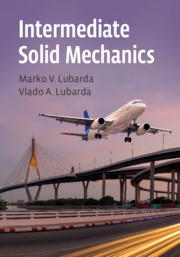Book contents
- Frontmatter
- Contents
- Preface
- Part I Fundamentals of Solid Mechanics
- Part II Applications
- 6 Two–Dimensional Problems of Elasticity
- 7 Two–Dimensional Problems in Polar Coordinates
- 8 Antiplane Shear
- 9 Torsion of Prismatic Rods
- 10 Bending of Prismatic Beams
- 11 Contact Problems
- 12 Energy Methods
- 13 Failure Criteria
- Further Reading
- Index
13 - Failure Criteria
from Part II - Applications
Published online by Cambridge University Press: 16 December 2019
- Frontmatter
- Contents
- Preface
- Part I Fundamentals of Solid Mechanics
- Part II Applications
- 6 Two–Dimensional Problems of Elasticity
- 7 Two–Dimensional Problems in Polar Coordinates
- 8 Antiplane Shear
- 9 Torsion of Prismatic Rods
- 10 Bending of Prismatic Beams
- 11 Contact Problems
- 12 Energy Methods
- 13 Failure Criteria
- Further Reading
- Index
Summary
A survey of failure criteria for brittle and ductile materials is presented. The maximum principal stress and the maximum principal strain criterion for brittle materials are introduced. The Tresca maximum shear stress and the von Mises energy criterion for ductile materials are formulated and applied to study the onset of plastic yield in thin-walled tubes and other structural members. The Mohr failure criterion is based on the consideration of Mohr's circles. The Coulomb–Mohr criterion for geomaterials incorporates the normal and shear stress, and the coefficient of internal friction. According to Drucker–Prager’s criterion, plastic yield occurs when the shear stress on octahedral planes overcomes the cohesive and frictional resistance to sliding. The fracture mechanics based failure criterion takes into account the presence of cracks. Failure occurs if the release of potential energy accompanying the crack growth is sufficient to supply the increase of the surface energy of expanded crack faces. The fracture criterion is also formulated in terms of the stress intensity factor K, whose critical value is the fracture toughness of the material.
Keywords
- Type
- Chapter
- Information
- Intermediate Solid Mechanics , pp. 438 - 477Publisher: Cambridge University PressPrint publication year: 2020



